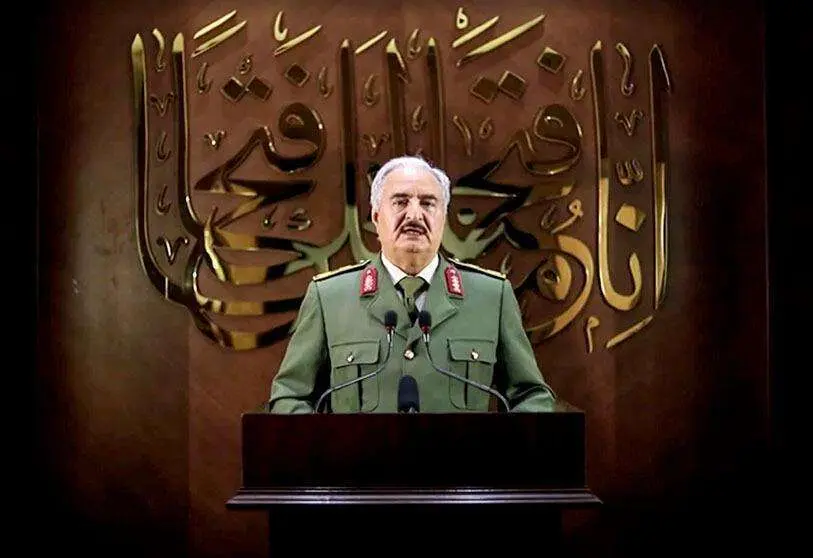Haftar warns that Libya will "never" accept "Turkish colonialism"

The drums of war are sounding louder than ever in Libya. The leader of the Libyan National Army (LNA), Field Marshal Khalifa Haftar, announced on Sunday his intention to "expel the Turks from Libya", claiming that his people "will never tolerate colonialism". Haftar made these statements during his visit to the Tariq bin Ziyad Brigade, to inspect the preparation of the military units operating in that region.
During his speech, the commander-in-chief of the LNA committed himself to confront the Turkish threat and to expel from Libyan territory all mercenaries coming from the Eurasian nation. The North African country will face - as Haftar pointed out - "every colonizer to expel him". "We are on the alert and their expulsion will be the main objective".
The difference of positions between the Libyan National Army and the National Accord Government (GNA) has opened a gap from which other foreign powers, including Turkey, mainly benefit. Over the past few months, Ankara has continued to transfer Syrian mercenaries to Libya to swell the ranks of the LNA. According to the Syrian Human Rights Observatory, there could be between 16,500 and 170,000 fighters supported by Turkey in Libya at the moment, including more than 350 minors. In recent weeks, speculation that Ankara could replace the Syrian mercenaries it sends to the North African nation with people of other nationalities such as Somalia or Yemen has only increased.
In his speech on the occasion of Eid al-Adha, Haftar accused the Turkish leader of "coming to Libya in search of the legacy of his ancestors", according to statements collected by the digital Arab News. Haftar has been clear with Erdogan and has warned that he will "translate the legacy of his ancestors into bullets", stating that "there will be no mercy" for any Turkish force in Libya, as they "do not deserve it". "The Libyans will never accept occupation by the Turks and will never again be colonised," he said. The LNA has confirmed once again that "the mercenaries who have arrived in their country are hired and trained. These groups have no home, no family and are only looking to make money.
The digital Arab News has in recent hours interviewed Samuel Ramani, a researcher at Oxford University in the UK, who has said that Haftar is intensifying his anti-Turkish rhetoric. "He really emphasizes that his war in Libya is not only a fight against extremism or the terrorist militias aligned with the GNA, but a fight for Libya's sovereignty and independence from Turkey's hegemonic agenda," he explained in the newspaper mentioned above. The LNA leader concluded that "all that remains is a battle between us and the invaders. We will teach them and the observers from afar a lesson," he said, according to the newspaper Asharq Al Awsat.
Turkey and Qatar support the Tripoli government, backed by the Muslim Brotherhood and internationally recognised by the United Nations, while the LNA is backed by Jordan, Saudi Arabia, Egypt, the United Arab Emirates, Sudan and Russia. In this spiral of instability, Egypt's foreign minister, Sameh Shoukry, held a telephone conversation on Sunday with his Algerian counterpart, Sabri Boukadoum, to discuss the latest developments in the region, especially those that have an impact on regional stability and Arab national security, such as the conflict plaguing the North African nation.
The two diplomats stressed the need to reach a comprehensive political agreement in Libya, according to the local media Libya Review. They also stressed the importance of "a ceasefire and an inclusive political solution", since the alternative - they warned - "will be the disappearance of the country from North Africa". For his part, the foreign minister of the United Arab Emirates (UAE), Anwar Gargash on Saturday criticised Ankara for "acting on colonial illusions" and called on the country on the Bosphorus to end "its interference in Arab affairs".








